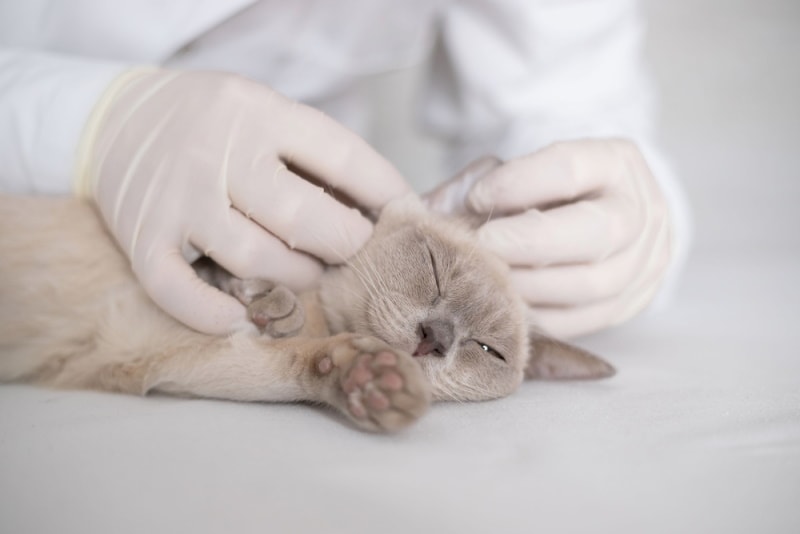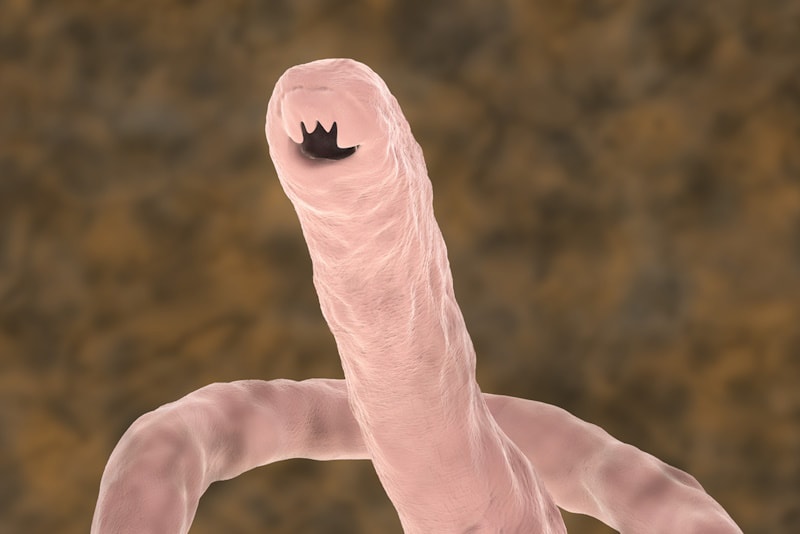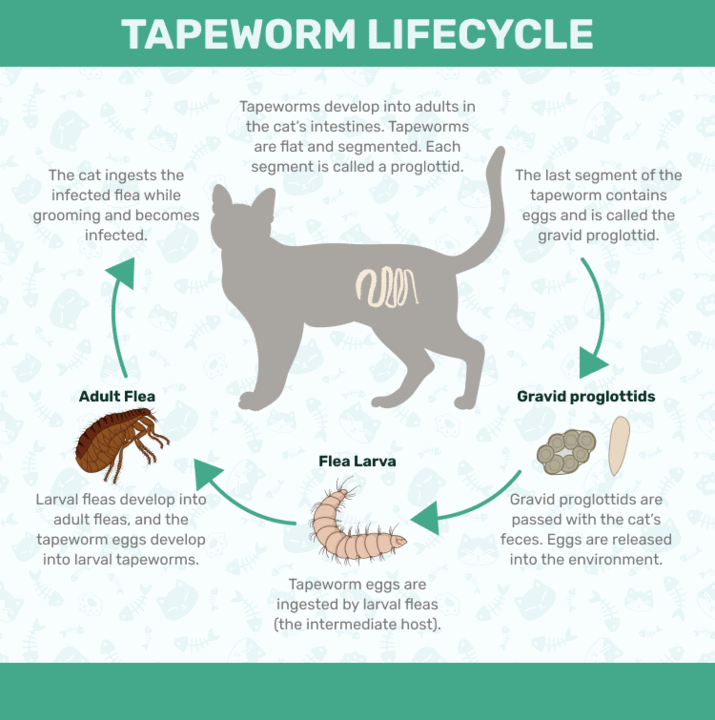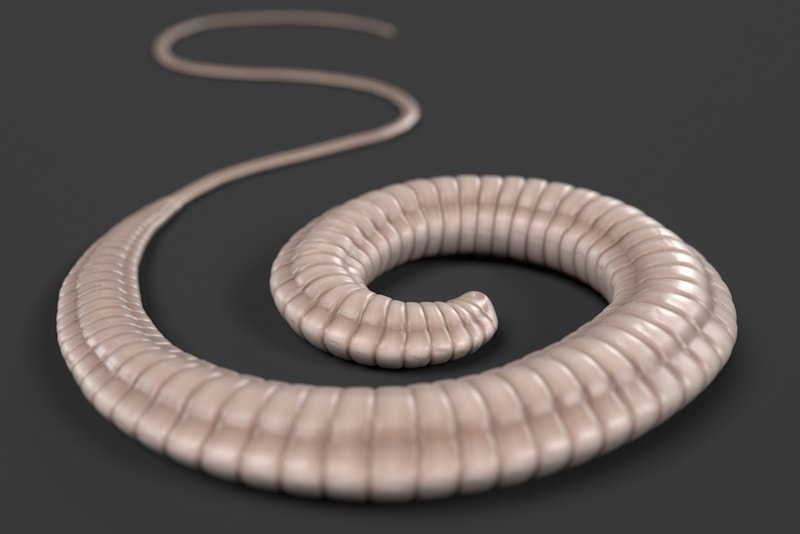4 Most Common Parasites & Worms in Cats (With Pictures)

Updated on

Intestinal parasites are a very common occurrence in cats. Cats typically become infested by ingesting infected feces, but there are other ways to contract parasites. While there are a number of parasites that can affect your cat, the four most common ones are discussed below, along with details on less-common parasites.
The 4 Common Parasites and Worms in Cats
1. Roundworms

What They Are: When you call your veterinarian to tell them you noticed worms in your kitten or cat’s stool, roundworms are typically what everyone thinks of. As adults, these worms will be defecated out as long, white worms, resembling spaghetti noodles.
Roundworm eggs ¹ are microscopic and can be diagnosed by most standard fecal exams. Roundworms live in the intestines and can often cause diarrhea, inappetence, or a bloated belly. They are the most common intestinal parasites seen in cats.
How Infestation Occurs: Cats become infested by ingesting the parasite eggs, either directly from infected feces or from ingesting infested rodents. However, kittens can also become infested from nursing from their mom—part of the parasite life cycle can migrate through the mom’s milk.
Other Important Info: It’s vital to know that these particular worms can also infest people. This is most commonly seen with kids who may play in the dirt or sandboxes used by outside cats. If there was an infested cat that defecated in these areas, a child may become infested if they then put their hands in their mouths or have an open wound that becomes contaminated.
Treatment: Roundworms are typically easy to treat with most dewormers. Re-infestation is possible, though, so it’s important to keep the litter box clean so that your cat doesn’t keep re-ingesting infected feces. Please speak with your regular physician or pediatrician if you believe you or a family member may be infested.
2. Hookworms

What They Are: Hookworms¹ are never visible to the naked eye. The worms themselves, or more commonly, their eggs, are diagnosed under the microscope. Hookworms can cause diarrhea, anorexia, and most commonly, bloody diarrhea.
As their name implies, the worms have tiny hook-like mouths that attach to the intestinal lining, damaging the mucosa and causing bloody diarrhea. If left untreated, cats can become severely anemic (low red blood cell count) from blood loss into the intestinal tract.
How Infestation Occurs: Similar to roundworms, hookworms infest cats by the ingestion of contaminated feces. The larvae can also infest a cat by penetrating the skin. However, it is unclear if kittens can also become infested by nursing on an affected mom, similar to roundworms.
Other Important Info: Due to the hook-like mouths, hookworms can also infest humans. They will most commonly penetrate through the skin, especially if there is an open wound, and migrate underneath the skin. It’s extremely important to always wear gloves or wash your hands when dealing with an infested cat or cleaning a litter box.
Treatment: Similar to roundworms, most dewormers will treat and kill hookworms. It’s still important to keep the litter box clean, though, to help avoid re-infestations.
3. Tapeworms

What They Are: Tapeworms¹ are fairly common parasites that can sometimes appear as “grains of rice” within the stool. The adult tapeworms may appear as long and flat “noodle-like” worms. As the worms mature and/or the cat poops them out, they break apart and resemble small rice pieces. The eggs are released intermittently in the segments, so they are not always visible on microscopic exams of the feces. Therefore, your veterinarian may just recommend deworming if your cat has a history of fleas and diarrhea.
Other important info: Infection may not be noticeable for weeks, or even months, after the flea infestation. It’s also important to note that indoor-only cats can still get fleas! It is a common myth that cats who don’t go outside can never get fleas. As veterinarians, we see fleas in indoor-only cats all of the time.
How Infestation Occurs: Tapeworms need fleas as intermediate hosts. Therefore, cats that>groom themselves and ingest fleas, groom other cats with fleas, or kill or eat rodents with fleas can become infested.
Other Important Info: Infestation may not be noticeable for weeks or even months after the flea infestation. It’s also important to note that indoor-only cats can still get fleas! It is a common myth that cats that don’t go outside can never get fleas. Veterinarians see fleas in indoor-only cats all the time.
Please do not, under any circumstances, purchase flea prevention over the counter for your cat. There are numerous popular products out there that you can get without a prescription, and many of these can cause serious skin irritation, tremors, and even death. Always get flea prevention through your veterinarian.
Treatment: There are great dewormers that can easily kill tapeworms. However, you must get your cat and your house on an appropriate flea treatment and continue with preventive medication. If you only treat with a dewormer and decline to give flea prevention, your cat will continue to groom themselves and continue re-infestation.
4. Coccidia
What They Are: Coccidia ¹ are not worms but can present with very similar signs. Coccidia are technically protozoa, which are single-celled organisms. Under a microscope, the cysts even appear similar to certain parasite eggs.
How Infestation Occurs: As with a number of intestinal parasites, cats become infested with coccidia by ingesting infected feces, typically from a cat that has defecated in shared soil or litter boxes. Cats can also become infested by consuming cockroaches or flies that carry coccidia cysts. Once infested, kittens will often develop diarrhea.
Other Important Info: Unlike hookworms and roundworms, the species of coccidia that affects cats cannot cause disease in humans.
Treatment: Since coccidia is a different kind of parasite, it is not killed by some dewormers! If left untreated, kittens can become severely dehydrated and sick. As with other gastrointestinal parasites, keeping the litter box and environment clean will help to control re-infestation.
Less-Common Parasites: Stomach Worms, Whipworms, and Lungworms

These worms are rare in domesticated cats in the United States. Your veterinarian may test for these in rare situations, but it is not common for them to cause problems.
Please speak with your veterinarian if you are concerned that your cat may have one of these less-common parasites. They are typically seen with outdoor-only cats or cats that have been housed with multiple other cats.
Conclusion
The three most common worms and the most common protozoa in cats share similar qualities. Infestation most commonly occurs by ingestion of contaminated feces, though the tapeworm needs fleas as intermediate hosts.
All of these infestations can be treated once diagnosed. Preventing re-infestation includes keeping the litter box clean, not allowing your cat outside, and washing your hands so you don’t become infested too. Regular fecal testing and prescription prevention (never use any OTC flea preventatives in cats) will help drastically reduce the possibilities of parasite infestations in your cats.
Read Also:
Featured Image Credit: Julija Sulkovska, Shutterstock











